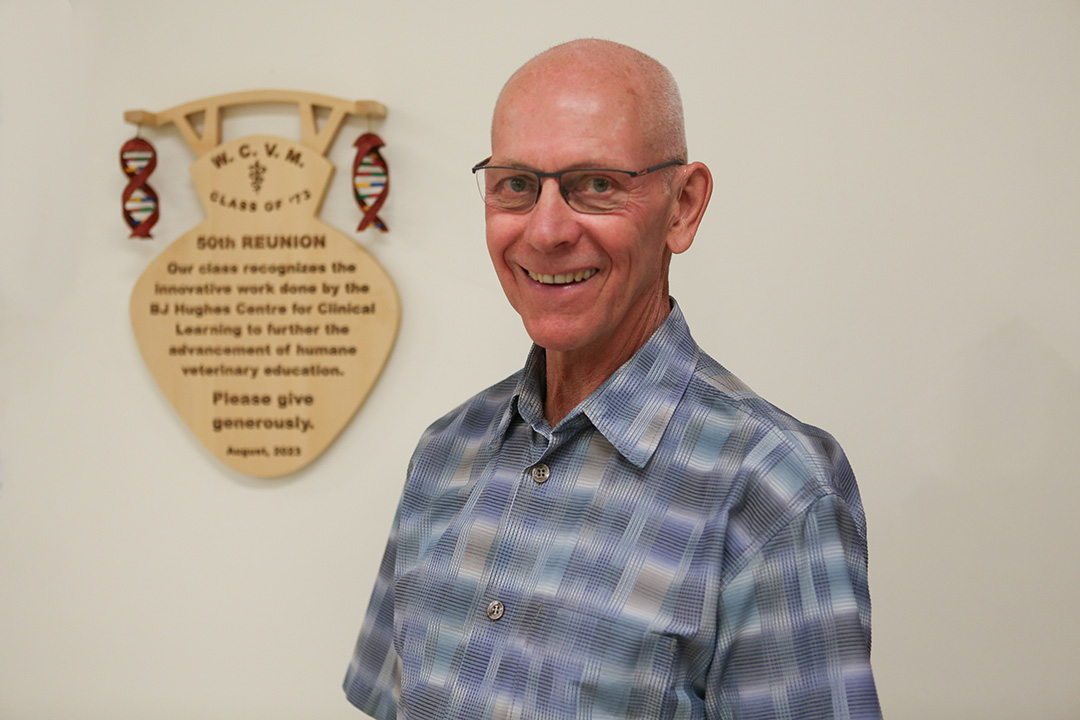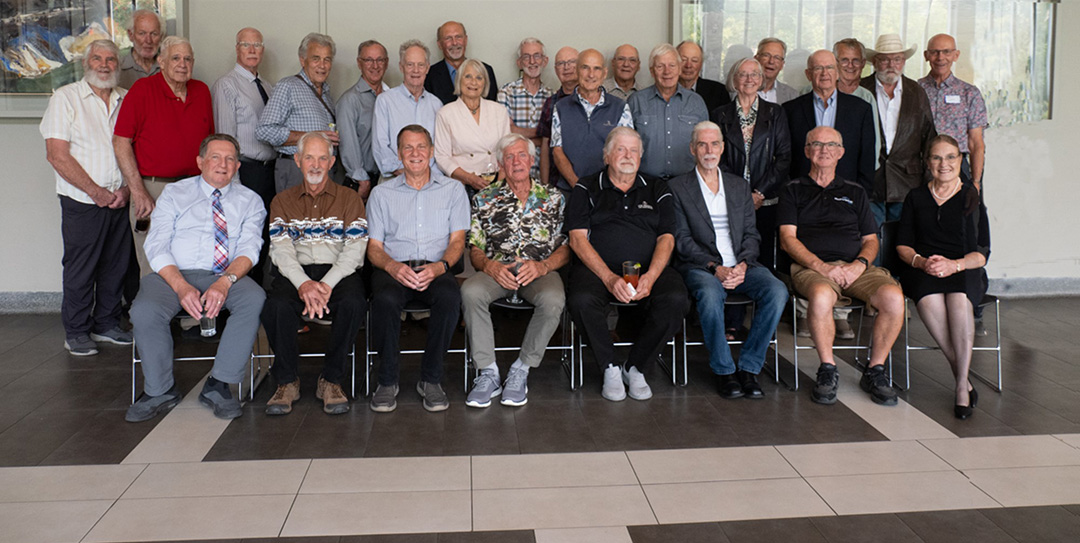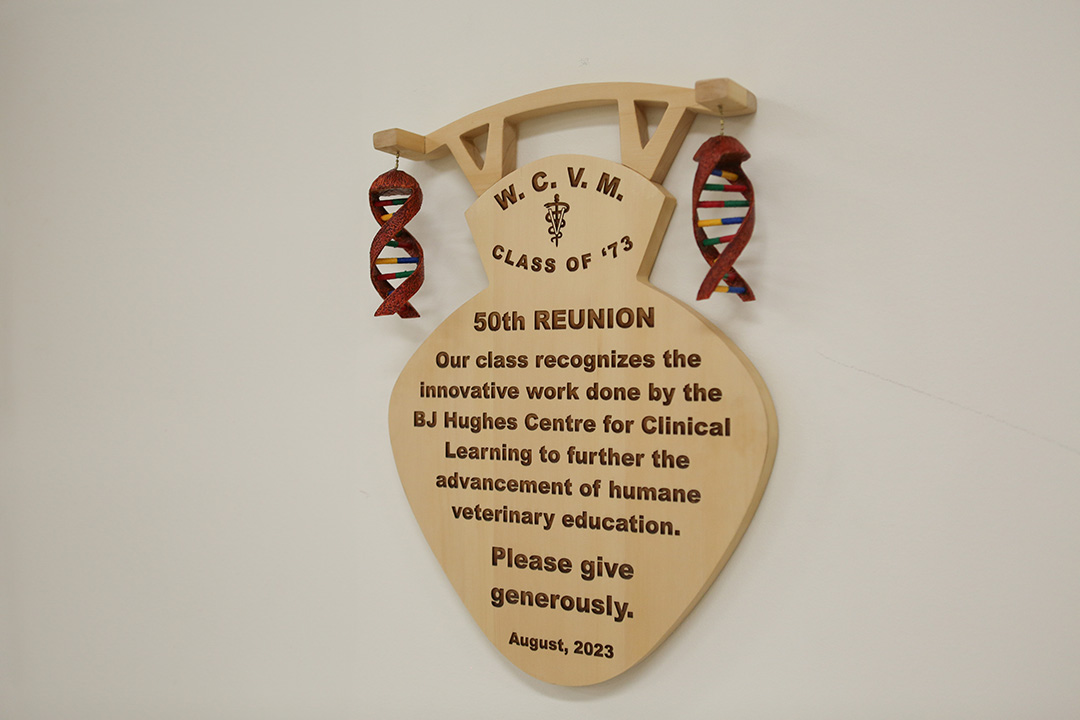
WCVM Class of 1973 showcases ‘giving spirit’ to simulation centre
More than 50 years after launching their veterinary careers at the Western College of Veterinary Medicine (WCVM), members of the college’s Class of 1973 gave a special gift to their alma mater that will support the hands-on education of future veterinarians.
By Tyler SchroederThe single class raised an impressive total of $113,000 in support of the veterinary college’s BJ Hughes Centre for Clinical Learning — the college’s simulation centre that plays a key role in the Doctor of Veterinary Medicine (DVM) program’s curriculum.
What led to the donation was a 50th class reunion in August 2023, which brought 29 members of the Class of 1973 and 23 spouses back to the veterinary college on the University of Saskatchewan (USask) campus.
In addition to reconnecting and celebrating a major milestone, the classmates also decided to commemorate the occasion in another way: a class fundraiser. It was a natural decision, based on the classmates’ connection with the WCVM and the importance of giving back.
Members of the Class of 1973 had decided to organize a college fundraiser before their reunion, but they were undecided about where their donation should be used. After touring the WCVM during the reunion, the group’s members were enthusiastic about supporting the BJ Hughes Centre for Clinical Learning.
The centre is named after Bev Hughes of Calgary, Alta, a longtime supporter of the WCVM. Significant contributions from Hughes, along with the BJ Hughes Foundation, allowed the college to create the high-tech clinical skills laboratory. The centre offers students a unique educational resource with a range of synthetic models and other simulation equipment for hands-on learning.
“It really grabbed everyone and there was interest in it right away. When we met that night, it was a clear and unanimous decision that the BJ Hughes Centre for Clinical Learning was our focus [for the fundraiser],” says Dr. Hugh Townsend (DVM), a member of the Class of 1973 and a WCVM professor emeritus.

One of the centre’s major components is its diverse collection of synthetic models — everything from a full-sized cow for calving simulations to high-fidelity silicone models of dogs. Having a steady supply of these synthetic models available for veterinary teaching allows students to continually practise procedures and techniques in a safe environment before applying their clinical skills on live animals.
With the generous donation from the class fundraiser, the BJ Hughes Centre for Clinical Learning will have additional funds to purchase vital pieces of simulation equipment that students can use to hone their skills and techniques.
This type of learning resource is invaluable to students — and it’s something that the Class of 1973 would have appreciated when they were first in the classroom. While they learned through hands-on experiences, the students didn’t have a lot of opportunities to build their clinical skills through repetition.
“Everybody [in our class] was overwhelmed with the difference between how skills were being taught now compared to when we were in school,” says Dr. Trent Watts (DVM), another Class of 1973 member who practised as a small animal veterinarian for many years in Saskatoon, Sask.
Besides his interest in the veterinary profession, Watts is a talented photographer and a skilled woodworker. That’s why his classmates asked him to build a plaque commemorating the class’s gift to the BJ Hughes Centre for Clinical Learning.
Watts initially intended to feature a variety of animal species alongside engraved text on the plaque: “I envisioned a carving with a number of animal images, but it didn’t seem like it was going to be practical to do that. I slept on it and began working on the drafting process."

Over several months, Watts brainstormed many ideas for the plaque before deciding on a unique design that incorporates two key visual elements. He used laminated yellow cedar to form the plaque in the shape of a stylized heart, then designed two DNA helix models that are suspended on either side of the plaque by two letter “Vs” — symbolizing veterinary medicine.
“All animals have a heart of some kind in addition to having DNA, so it was my intention to have that type of representation in the design,” says Watts.
The plaque also features text encouraging others to donate to the WCVM. Laser Impressions, a Saskatoon-based company, produced the laser-engraved text and mounted the completed plaque.
Seeing the plaque featured on a wall inside the simulation centre gives Watts a sense of joy.
“I have a real gratitude for my classmates who trusted me to make this, and I’m really satisfied with how it all came together,” says Watts. “I’m thrilled to know that it’s here and that is has the potential to make a difference.”
As visitors to the centre discover the plaque and read its inspiring words, Townsend points out that the overall goal of his classmates’ donation is to send a message to others about the impact of giving back — not to draw attention to the Class of 1973.
“I hope it will make an impression on current students and others, and I hope it will help them realize that as they move through their careers, there will be opportunities to support WCVM in any way that they choose.”
Together we will support and inspire students to succeed. We invite you to join by supporting current and future students' needs at USask.
